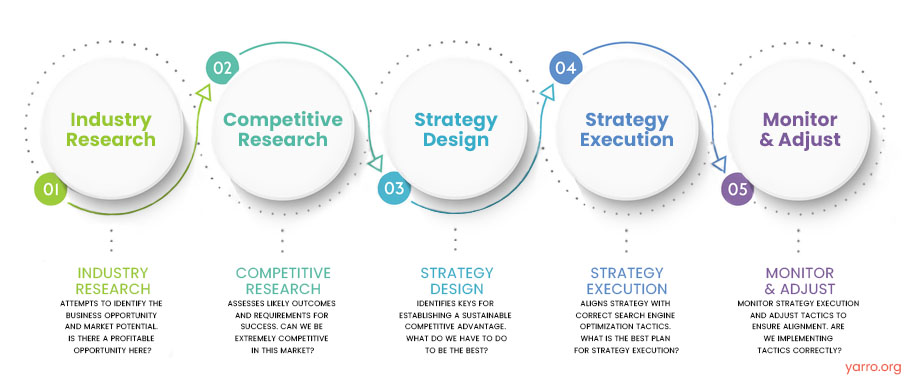SEO Strategy
What is SEO Strategy

Definition:
Search Engine Optimization (SEO) strategy is a comprehensive plan designed to improve a website’s visibility and ranking on search engine results pages (SERPs). It involves optimizing various elements of a website to align with search engine algorithms, enhancing organic traffic, and ultimately increasing the likelihood of attracting and retaining visitors.
Analogy:
Think of an SEO strategy as the roadmap for a business in a bustling city. Just as a well-planned route ensures the business reaches its destination efficiently, an effective SEO strategy guides a website through the digital landscape, navigating search engine algorithms to reach the top positions in search results.
Further Description:
An SEO strategy encompasses a range of activities, including:
Keyword Research and Optimization: Identifying relevant keywords that users commonly search for and strategically incorporating them into website content for improved search engine visibility.
On-Page SEO: Optimizing individual pages of a website by fine-tuning elements such as meta tags, headings, and content to align with search engine algorithms.
Off-Page SEO: Building external factors that influence a website’s authority and credibility, including backlinks from reputable sources and social media signals.
Technical SEO: Addressing technical aspects of a website, such as site speed, mobile responsiveness, and crawlability, to enhance the overall user experience and meet search engine standards.
Content Creation and Optimization: Producing high-quality, relevant content that not only engages visitors but also aligns with search intent and keywords, contributing to higher search rankings.
Analytics and Performance Monitoring: Utilizing tools to track website performance, user behavior, and keyword rankings, allowing for continuous refinement of the SEO strategy.
Why is SEO Strategy Important?
Increased Visibility: A well-executed SEO strategy enhances a website’s visibility, making it more likely to appear in relevant search results and attracting a larger audience.
Credibility and Trust: Higher search rankings contribute to a website’s credibility and trustworthiness, as users often associate top-ranked pages with authority in their respective fields.
Targeted Traffic: By optimizing for specific keywords and search intent, an SEO strategy ensures that the traffic directed to a website is more likely to be interested in its products or services.
Long-Term Sustainability: Unlike some short-term marketing tactics, SEO strategies provide lasting benefits, contributing to sustained online visibility and traffic growth.
Examples and Usage:
Local SEO: Optimizing a website to appear in local search results, including the use of location-specific keywords and creating a Google My Business profile.
Link Building: Engaging in outreach and partnerships to acquire high-quality backlinks, improving a website’s authority, and influencing search rankings.
Content Marketing: Developing and promoting valuable content, such as blog posts, infographics, and videos, to attract organic traffic and enhance overall SEO performance.
Key Takeaways:
- SEO strategy involves optimizing various elements of a website to improve search engine rankings.
- Components include keyword research, on-page and off-page optimization, technical SEO, content creation, and analytics.
- Benefits include increased visibility, credibility, targeted traffic, and long-term sustainability.
- Examples of SEO strategies include local SEO, link building, and content marketing.
Table of Contents




